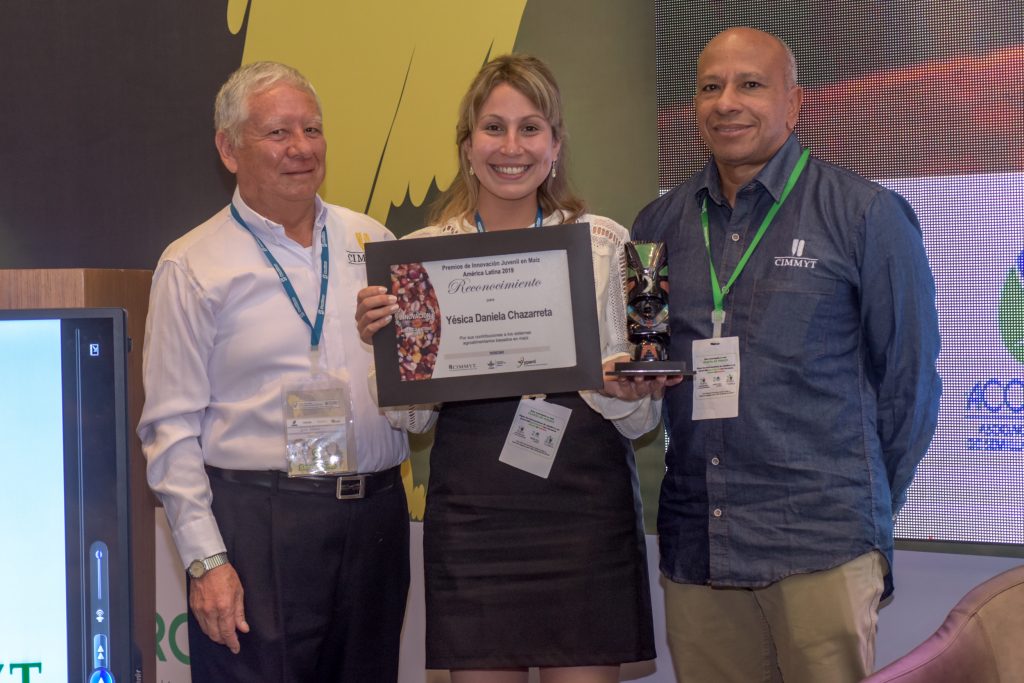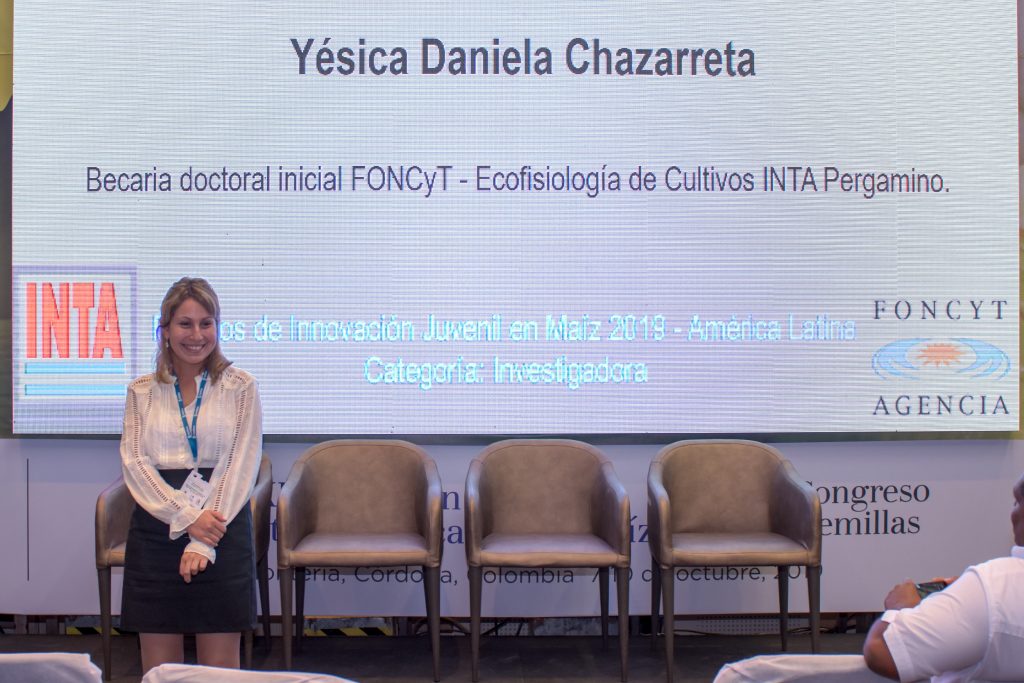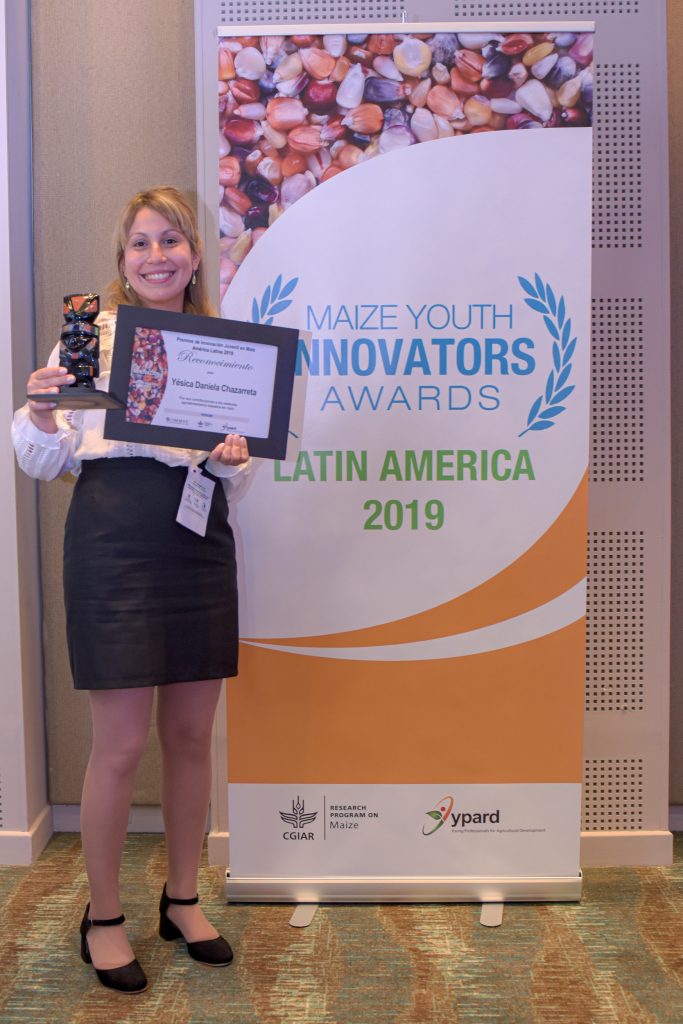
Yésica Chazarreta studies how later planting dates affect maize production in Argentina
By Jennifer Johnson
Yésica Chazarreta investigates how later planting dates affect the maize production of farmers in Argentina’s main maize growing region. The young researcher is working with the Crop Ecophysiology group at the National Agricultural Technology Institute (INTA) Pergamino in Buenos Aires, Argentina, conducting research on maize grain drying, filling and quality in order to help farmers make more informed decisions on when to harvest in order to increase their yields. Yésica recently received the MAIZE Youth Innovators Award 2019 – Latin America in the category of Researcher for her involvement in this work.
The awards, an initiative of the CGIAR Research Program on Maize (MAIZE), seek to recognize the contributions of young women and men who are implementing innovations in Latin American maize-based agri-food systems. This is the third instalment of the awards, following Asia in October 2018 and Africa in May 2019. The awards ceremony took place at the 23rd Latin American Maize Reunion in Monteria, Colombia on October 9, 2019.

Q.) Describe your innovation
A.) I am from the pampas region of Argentina, which is the center of maize production for my country. In the past, most farmers planted in our springtime, around September and October. These early plantings tended to have unstable yields over the years, causing many farmers to begin to plant later, in November and December. These later plantings have lower yields, but these yields have less inter-annual variability and are more stable overall. However, delaying sowing dates imply that the crops are in the field during the wintertime, when they are more vulnerable to moisture, lodging, disease and yield loss. In addition, they are more prone to mycotoxins, toxic fungi that are harmful if consumed in large quantities and can cause cancer or even death.
My work has been to try to understand the effect of later planting dates on maize kernel filling, kernel desiccation and grain quality. This will allow us to create prediction models about the kernel moisture evolution of maize grains at harvest time, to assist farmers in the decision making process of when to harvest, especially for later maize planting. This will help farmers to decide whether to wait for their maize crop to dry in the field or to harvest early and dry afterwards in order to reduce losses—a sort of cost-benefit analysis of planting and harvest dates.

Q.) What inspired you to pursue a career in agriculture?
A.) My father is an agronomist and he works for a seed company, and my little sister and I grew up going to the fields with him to see the crops and we were always very interested in agriculture. I studied at an agro technical high school, and went on to pursue a bachelor’s degree in genetics. For my undergraduate thesis I worked with the Crop Ecophysiology group at the National Agricultural Technology Institute (INTA) Pergamino and began to work on maize planting dates, and grain filling and drying processes. We began to notice that there was a lot of interest from companies but little available information on maize grain drying with late planting dates, so when I graduated I applied to do my Ph.D. on this research.
In addition to really liking my job, I also really like my working group—it is a multidisciplinary team, and all of my colleagues are great people and professionals. I feel that they have helped me grow both personally and academically.
Q.) How does it feel to be a winner of the MAIZE Youth Innovators Awards?
A.) It’s so hard to describe! Very excited and very happy to be able to share my team’s work with so many researchers in this field, and to have the opportunity to meet and collaborate with so many new people. This has been a very enriching experience for me.
Q.) What advice do you have for other young people that are interested in Agriculture?
A.) First, always study what you really like and are interested in. Always think of the reality of your work and the ability to share it with other people. Do what you like, find your vocation and do it with purpose and passion. Most importantly, apply for opportunities such as the MAIZE Youth Innovators Awards! They are a great way to share your work with the world.

2019 MAIZE Youth Innovators Awards Latin America, Argentina, Maize, MYIA 2019, MYIA 2019 Latin America
